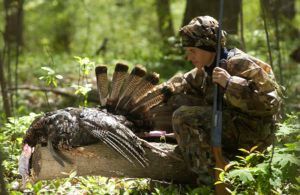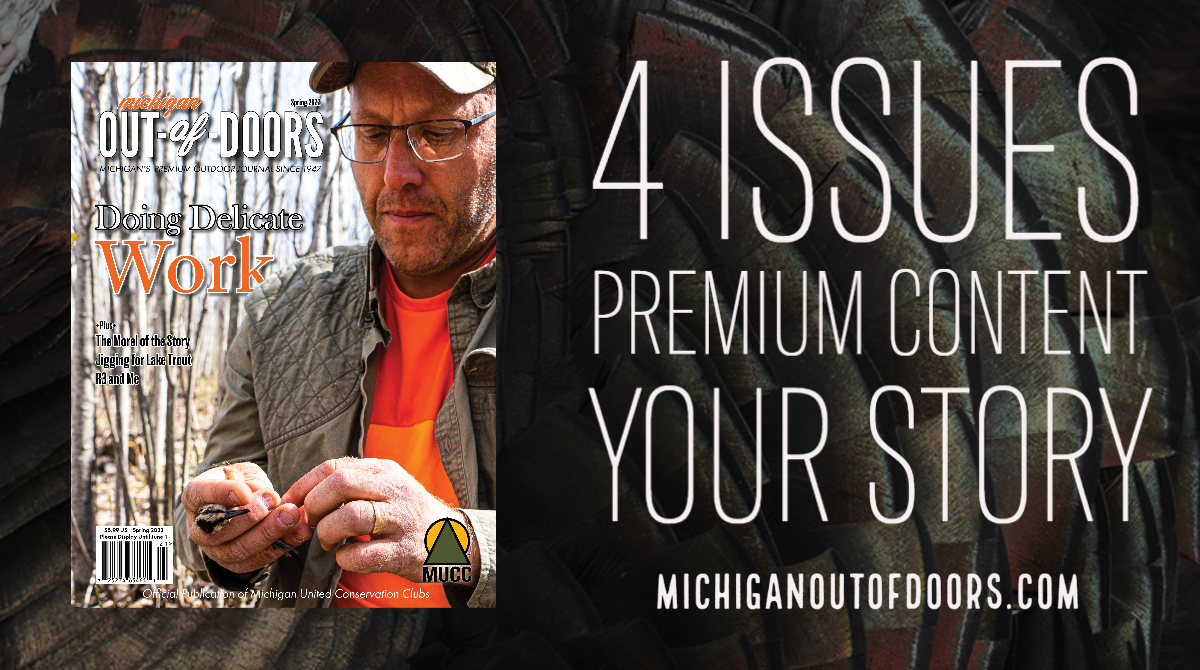Michigan Turkey Hunting History
Fifty birds.
That’s what can be thanked for Michigan’s robust and liberal turkey seasons, our world-class turkey habitat and the opportunity to pursue turkey in all of Michigan’s 83 counties.
Fifty birds.
That’s what can be thanked for rallying conservation organizations, stakeholders, agencies and enthusiasts alike around arguably one of America’s most loved and hunted bird species.
Fifty birds.

A youth hunter poses with his turkey kill after a successful spring hunt. Photo courtesy of Michigan DNR, Dave Kenyon
For more than 15 years, those same conservation groups and agencies monitored, championed, created habitat for and bettered the eastern American turkey before a hunting season was ever established in Michigan.
Those 50 turkeys purchased from Pennsylvania in the 1950s serve as a reminder of the work that we can do when grassroots coordination and voices combine with biologist expertise and state agency prowess.
While states try to understand turkey population declines and deal with the issue, we haven’t seen the same precipitous drop in Michigan. Perhaps it’s our well-managed habitat, coordinated public land opportunities or, more likely, a combination of factors that can’t all be measured?
Since those 50 birds and the 1950s, Michigan United Conservation Clubs has been committed to turkey habitat, hunting opportunities and expanded access.
Here are just a few of the MUCC’s member-passed resolutions (and who introduced them) since 1999 that have come to fruition through the hard work of our members and the same folks who brought those first 50 birds to Michigan:
1999 (MUCC District 10) – Shooting hours for turkey:
Urge Natural Resources Commission to change the shooting hour closing time for wild turkey hunting from 4:00 pm to one half hour before sunset. This was passed into law.
2000 (Michigan National Wild Turkey Federation, Affiliate Club) – May hunt season length:
Work with the DNR to modify the spring turkey hunting season, starting in 2001, with an increase in the unlimited hunt from 2 to 4 weeks in the month of May. For unlimited hunts, all zones with turkeys would be open to hunting except public land in Zone 3 where the DNR would determine the hunting license quotas. This was passed into law.
2010 (Millard Holton, individual Member) – Expanding Hunting Opportunities from Elevated Platforms:
Work with the Department of Natural Resources (DNR) and the Natural Resources Commission (NRC) and frame a Wildlife Order that would incorporate most, if not all, of the following species— small game, elk, bobcats, woodchuck and turkeys— into regulations that would legalize these game species to be hunted from elevated platforms with firearms on both public and private lands. This was passed into law in 2019 by the Natural Resources Commission.
2016 (Millard Holton, Individual Member) – Changing the Starting Date of the Early Spring Turkey Season:
MUCC supports moving the start date of the early turkey season in southern Michigan (private land unit ZZ) up from a Monday to the prior Saturday. This was passed into law in 2019 by the Natural Resources Commission.
2021 (Zach Snyder, Individual Member) – Allow Hunters One Leftover Spring Turkey Tag:
Michigan United Conservation Clubs will work with the Michigan Department of Natural Resources and the Michigan Natural Resources Commission to allow spring turkey hunters the opportunity to purchase one leftover turkey tag in addition to their already purchased tag when leftover tags become made available to the general public.
To learn more about the policy and resolution process, visit https://mucc.org/conservation-policy-board/ . There, you will find a path to policy document, how to start the process, what resolutions are moving forward to our June 2022 Annual Convention and much more.
You must be an MUCC member to submit a resolution.
Michigan Out-of-Doors Magazine
With your MUCC membership, you will get four issues of
Michigan Out-of-Doors Magazine
delivere
 d to your mailbox. This 100-page quarterly journal tells your hunting, fishing, trapping and conservation story.
d to your mailbox. This 100-page quarterly journal tells your hunting, fishing, trapping and conservation story.
This magazine makes a great gift for that turkey hunter, mom, dad or conservationist in your life that enjoys learning more deeply about Michigan’s conservation landscape, hunting, fishing or trapping. Michigan Out-of-Doors has been published by Michigan United Conservation Clubs since 1947.
The post Michigan Turkey Hunting History appeared first on Michigan United Conservation Clubs.
Recent Posts



